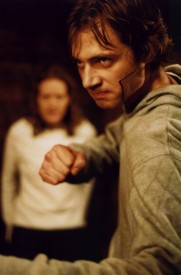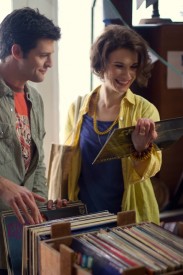 Kingsman: The Secret Service is about a working class young man (Eggsy, played by Taron Egerton) who finds himself amongst the new recruits for a top secret service of upper class spies. Directed by Matthew Vaughan, the film tries to say something about class – that it’s not defined by your background, but your attitude – and has attracted some interest for casting an able-bodied actress (Sofia Boutelle) as a disabled character. It may sound liberal, but it’s actually very right-wing – Obama gets his head blown up, and the bad guy is an environmentalist.
Kingsman: The Secret Service is about a working class young man (Eggsy, played by Taron Egerton) who finds himself amongst the new recruits for a top secret service of upper class spies. Directed by Matthew Vaughan, the film tries to say something about class – that it’s not defined by your background, but your attitude – and has attracted some interest for casting an able-bodied actress (Sofia Boutelle) as a disabled character. It may sound liberal, but it’s actually very right-wing – Obama gets his head blown up, and the bad guy is an environmentalist.
But the film’s biggest issue, for me, is its misogyny.
Kingsman: The Secret Service has four female characters.
The first (Samantha Womack, née Janus) is the hero’s mother – a female character existing only in relation to a male one. Her boyfriend beats her up – a damsel in distress serving only to be saved by the hero.
The second (the aforementioned Sofia Boutelle) is the bad guys’s henchwoman. Superficially she’s pretty cool and bad-ass, but really all she does is follow the commands of her boss – a man.
The third (Sophie Cookson) is set up as if to be the love interest, but that angle is never pursued. Instead she fills more of the ‘best friend’ role – that’s a little more original – but she’s the single token woman in the ranks of new recruits. And she’s the worst recruit. She messes up all the time and has to be saved by the hero.
But it’s the fourth that really made me ashamed of both my gender and my industry.
Hanna Alström plays Princess Tilde, a character who exists to be captured by the bad guy and rescued by the hero. As if that’s not bad enough, Tilde offers Eggsy anal sex if he frees her. And if that‘s not appalling enough, the movie ends with a shot of her naked behind as she looks over her shoulder as if to say, “My hero, you’ve saved me. Now take your reward.”
Vaughan is unable to see the misogyny in this. “It’s a celebration of women and the woman being empowered in a weird way in my mind,” he says. He seems to think that because the woman offers the man anal sex it’s a clever reversal of all those movies where the hero beds the leading lady as his prize.
But how many people were sat in the cinema thinking, “Ha ha ha, how brilliantly Mr. Vaughan has satirised the cinematic trope of the hero ‘winning the girl’ by pushing it into the realm of absurdity.” And how many were thinking, “Yep, that’s normal.” And worse still, how many were thinking, “Yeah, take it up the arse, bitch, like you deserve.” The filmmakers might be horrified by that latter comment, but that’s the kind of attitude they’re reinforcing.
This objectification is not how I want to see women. It’s not how I want women or men to expect me to see women. And it’s not how I want society and the media to tell me I should see them. So I’d like to offer a few observations and suggestions to Vaughan and his co-writer Jane Goldman.
- The prevalence of female characters who exist only to be saved can make men think that women cannot be equal partners or authority figures, which is bad for society as a whole.
- It’s wrong to teach young men (who will be the bulk of Kingsman’s target audience) that they deserve sex.
- It’s wrong to teach young women that they are expected to offer sex as a reward or a currency.
- It’s wrong to teach anyone that sex is the only thing women have to offer.
- It’s wrong to perpetuate the ridiculous trope that women need to accept anal sex from their partner on special occasions or as a reward, regardless of whether they’re fully comfortable with it or not. It’s equally wrong to train men to ask for anal sex from women and see it as a badge of honour, when they might not be comfortable with it either.
- It’s wrong to require an actress to do gratuitous nudity, doubly so for a scene that seems to exist purely in the service of misogyny.
- Jokes that satirise a trope by repeating that trope may well do more harm than good.
- The closing image of a film can be very powerful. To close a film with an image that degrades 50% of the world’s population is irresponsible to say the least. (Technically there is another shot after the naked backside shot, but it’s the naked backside shot that everyone will remember.) Did you actually stop to think how a woman in the audience might feel being left with that image, particularly if she’s sat next to her boyfriend who has also been left with that image and may now be feeling some sense of entitlement?
There has to be more responsibility on issues like this from filmmakers who are reaching huge audiences. You have the power to change the world. Use it.





